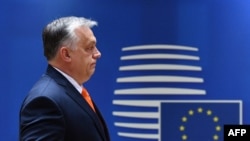Hungary takes over the EU's rotating presidency on Monday, promising to be an "honest broker" despite widespread concerns over what critics see as an authoritarian, Russia-friendly government.
Nationalist Prime Minister Viktor Orban, who has run the central European country since 2010 aiming to transform it into an "illiberal democracy," frequently clashes with Brussels on rule-of-law and human rights issues.
He is also the only EU leader who has maintained ties with Russia despite its invasion of Ukraine. He has refused to send arms to Kyiv and repeatedly criticized sanctions against Moscow over the war.
Last year, the European Parliament adopted a non-binding resolution highlighting Hungary's "backsliding" on democratic values, and questioning how it could "credibly" assume the bloc's six-month presidency.
Budapest insists it is ready to assume "the duties and responsibilities" steering the bloc of 27 countries.
"We will be honest brokers, working loyally with all member states and institutions," Hungarian EU Affairs Minister Janos Boka said in mid-June as he unveiled the presidency's program.
"At the same time, we believe Hungary has a strong mandate to pursue a strong European policy. Our work will reflect this vision of Europe," he added.
Hungary's program slogan? "Make Europe Great Again" — echoing the rallying cry of Orban's "good friend" former US president Donald Trump — which already caused a stir in Brussels.
After Hungary last held the EU presidency in 2011, Orban boasted about handing out "flicks," "smacks," and "friendly slaps" to the "excitable tormentors" of the European Parliament.
This time, the nationalist leader, 61, is even more combative, having vowed to "occupy Brussels" during the campaign for European elections in early June, banking on a right-wing breakthrough.
But even though far-right parties made gains, Orban's Fidesz party currently stands isolated, unable to find a group in the European Parliament that suits it.
On Sunday, Orban announced he wanted to form his own group, together with Austria's far-right Freedom Party (FPOe) and the centrist ANO party of ex-Czech premier Andrej Babis.
They still need parties from at least four other countries to join them.
Last week, Orban failed to derail a deal to return Ursula von der Leyen as head of the powerful European Commission and two others from a centrist alliance taking the other top jobs.
Meanwhile, von der Leyen put off a courtesy visit to Budapest, originally planned for the presidency opening. A new date has not been set.
To garner support for Hungary's program, Orban toured key European capitals last week.
Among the country's seven priorities for its EU presidency are stemming "illegal migration" and bringing the Western Balkans countries "one step closer" to EU membership.
Orban can use the presidency to set the agenda, but he cannot achieve results without the commission's support, Daniel Hegedus, a senior fellow at the German Marshall Fund told AFP.
He also noted that the Hungarian premier has limited opportunity to act as a spoiler, as the outgoing Belgian presidency and EU institutions have rushed to conclude important decisions.
Last week, the European Union adopted a fresh sanction package against Russia and formally launched "historic" accession talks with Ukraine.




